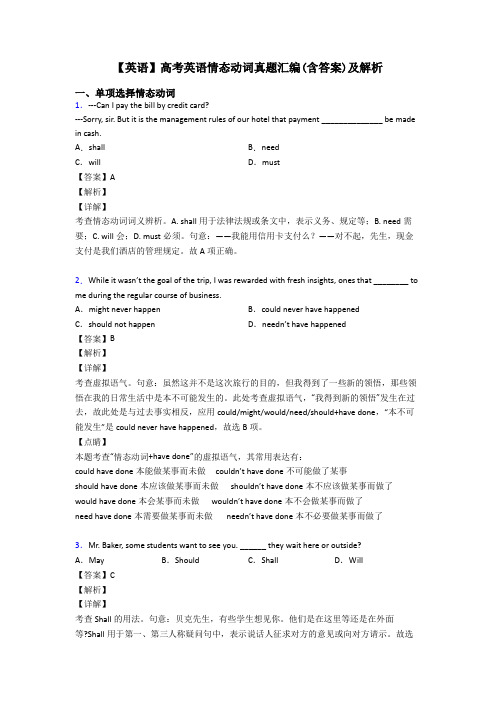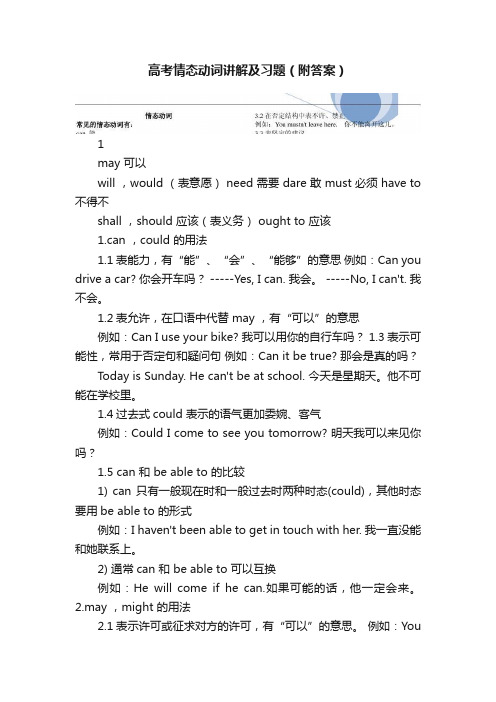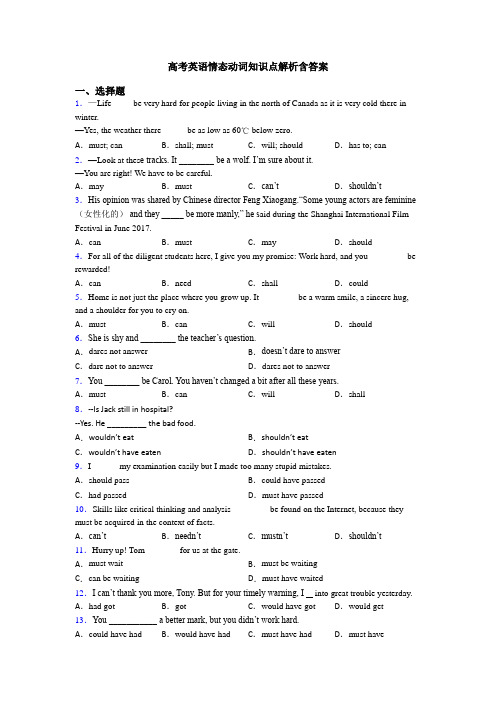高考英语情态动词讲解及习题(附答案)
情态动词讲解以及倒装句练习40题(附答案)

may和might的用法 和 的用法
1. 表示许可。 表示请求、允许时,might比may的语气更委婉一些,否定回答时(口语中常 用) no , you can't . or , yes, please 用mustn't表示“不可以”、“禁止”、“阻 止”之意(具有强烈禁止的意思)如: You may drive the car. — Might I use your pen? — No, you mustn't. 用May I ... 征询对方许可在文体上比较正式,在口气上比较客气。在日常 口语中,用Can I ... 征询对方意见在现代口语中更为常见。
must和have to的用法 和 的用法
1. 表示必须、必要。(must表示主观多一些而have to则表示客观多一 些)如: You must come in time. 回答must引出的问句时,如果是否定的回答,不能用mustn't,而 要用needn't或don't have to。 — Must we hand in our exercise books today? — Yes, you must. (No, you don’t have to.)
Could 和 can 的用法
. 表示能力或客观可能性,还可以表示请求和允许。如: Can you finish this work tonight? Man can not live without air. — Can I go now? — Yes, you can. 注意:①could也可表示请求,语气委婉,主要用于疑问句,不可用于肯定句, 答语应用can(即could不能用于现在时态的简略答语中)。如: Could I come to see you tomorrow? Yes, you can. (否定答语可用No, I'm afraid not.) ②can表示能力时,还可用be able to代替。如: I'll not be able to come this afternoon.
【英语】高考英语情态动词真题汇编(含答案)及解析

(2)We shall have a good time in the park.我们在公园里会玩得很高兴的。常考的特殊用法
1. Shall用于第一人称,表示征求对方的意愿。如:What shall we do this evening?
8.—You rang me up at about 10:00 last night, didn't you?
—No, I didn't phone you. Itsomeone else.
A.must have beenB.could beC.must beD.could have been
【答案】A
【答案】C
【解析】
【详解】
考查Shall的用法。句意:贝克先生,有些学生想见你。他们是在这里等还是在外面等?Shall用于第一、第三人称疑问句中,表示说话人征求对方的意见或向对方请示。故选C。
【点睛】
Shall的用法
Shall作为助动词,一般用于第一人称Ⅰ和We,表示一个将来的动作,构成将来时态。Shall后面接动词原形。例如:
11.—Sorry, Mum! I failed the job interview again.
—Oh, it's too bad. You________ have made full preparations.
A.mustB.canC.wouldD.should
【答案】D
【解析】
【详解】
考查情态动词+have done结构。句意:—对不起,妈妈,我面试又失败了。—噢,那太糟糕了,你应该做好充分准备的。A.must必须;B.can可以;C.would将会;D.should应该。这里是情态+have done的结构的虚拟语气,can+have+done”表示对过去行为的怀疑,用于疑问句,译成“可能做过……吗?”;could+have+done,表示对过去事情的假设,意思是本来能够做某事而没有做;must+have+done”表示对过去事情的肯定推测,译成“一定做过某事”,该结构只用于肯定句;should+have+done意思是“本来应该做某事,而实际没做”。故选D
高考情态动词讲解及习题(附答案)

高考情态动词讲解及习题(附答案)1may 可以will ,would (表意愿) need 需要 dare 敢 must 必须 have to 不得不shall ,should 应该(表义务) ought to 应该1.can ,could 的用法1.1表能力,有“能”、“会”、“能够”的意思例如:Can you drive a car? 你会开车吗? -----Yes, I can. 我会。
-----No, I can't. 我不会。
1.2表允许,在口语中代替 may ,有“可以”的意思例如:Can I use your bike? 我可以用你的自行车吗? 1.3表示可能性,常用于否定句和疑问句例如:Can it be true? 那会是真的吗?Today is Sunday. He can't be at school. 今天是星期天。
他不可能在学校里。
1.4过去式could 表示的语气更加委婉、客气例如:Could I come to see you tomorrow? 明天我可以来见你吗?1.5 can 和 be able to 的比较1) can 只有一般现在时和一般过去时两种时态(could),其他时态要用be able to 的形式例如:I haven't been able to get in touch with her. 我一直没能和她联系上。
2) 通常can 和 be able to 可以互换例如:He will come if he can.如果可能的话,他一定会来。
2.may ,might 的用法2.1表示许可或征求对方的许可,有“可以”的意思。
例如:Youmay go now. 你可以走了。
May I use your computer? 我用一下你的电脑可以吗? 2.2回答以may 开头的疑问句有如下表达法:例如:May I smoke here? 我可以在这儿抽烟吗? -----Yes, you may. -----Yes, please. ------No, you can't. ------No, you mustn't. ------No, you'd better not.2.3表示猜测,通常只用于陈述句例如:You may be right. 你可能是对的。
(英语)高一英语情态动词解题技巧及练习题(含答案)

(含答案)一、单项选择情态动词1.—It ’ s so hot and uncomfortable here! Why are your windows still closed? —Oh, I ’ m not to blame. They ___ open.A. shan ’t B. mustn ’t C. won ’t D . wouldn ’t【答案】C【解析】【详解】考查情态动词辨析。
句意:---这里又热又不舒服!你的窗户怎么还关着?---哦,不该责备我啊。
窗户打不开了。
shan' t= shall no意为不可,不应";mustn' t=must not意为不要”;wouldn't=would not意为不会,不愿意"。
won' t=will not意为不会,不能“,will在这里表示能力、功能。
例如:This auditorium will seat one thousand people. 这个礼堂能容纳一千人。
这句话意思是“这扇窗不能打开” ,故选 C 项。
2.—What ’ s wrong with you?—Oh, I am sick. I __ so much ice cream just now.A.shouldn ’ t eat B.mustn ’ t eatC.couldn ’ t have eaten D.shouldn ’ t have eaten【答案】D【解析】【详解】考查情态动词和虚拟语气。
句意:——你怎么了?——我生病了,我刚才不应该吃那么多冰激凌。
A. shouldn ' t eat应该吃;B. mustn' t e豢止吃;C. couldn ' t have eaten可能吃;D. shouldn ’ t heaveaten 本来不应该吃。
根据just now 可知,是发生在过去,故选D。
高考英语情态动词知识点解析含答案

高考英语情态动词知识点解析含答案一、选择题1.—Life ____ be very hard for people living in the north of Canada as it is very cold there in winter.—Yes, the weather there _____ be as low as 60℃ below zero.A.must; can B.shall; must C.will; should D.has to; can 2.—Look at thes e tracks. It ________ be a wolf. I’m sure about it.—You are right! We have to be careful.A.may B.must C.can’t D.shouldn’t3.His opinion was shared by Chinese director Feng Xiaogang.“Some young actors are feminine (女性化的)and they _____ be more manly,” he s aid during the Shanghai International Film Festival in June 2017.A.can B.must C.may D.should4.For all of the diligent students here, I give you my promise: Work hard, and you ________ be rewarded!A.can B.need C.shall D.could5.Home is not just the place where you grow up. It ________ be a warm smile, a sincere hug, and a shoulder for you to cry on.A.must B.can C.will D.should6.She is shy and ________ the teacher’s question.A.dares not answer B.doesn’t dare to answerC.dare not to answer D.dares not to answer7.You ________ be Carol. You haven’t changed a bit after all these years.A.must B.can C.will D.shall8.--Is Jack still in hospital?--Yes. He _________ the bad food.A.wouldn’t eat B.shouldn’t eatC.wouldn’t have eaten D.shouldn’t have eaten9.I ______my examination easily but I made too many stupid mistakes.A.should pass B.could have passedC.had passed D.must have passed10.Skills like critical thinking and analysis ________ be found on the Internet, because they must be acquired in the context of facts.A.can’t B.needn’t C.mustn’t D.shouldn’t 11.Hurry up! Tom _______ for us at the gate.A.must wait B.must be waitingC.can be waiting D.must have waited12.I can’t thank you more, Tony. But for your timely warning, I into great trouble yesterday. A.had got B.got C.would have got D.would get 13.You ___________ a better mark, but you didn’t work hard.A.could have had B.would have had C.must have had D.must have14.He did not regret saying what he did but felt that he _________ it differently.A.could express B.would expressC.could have expressed D.must have expressed15.There are still 30 minutes ____, so we ____ hurry with lunch.A.going…needn’t B.to leave…don’t need C.leaving…needn’t to D.to go…needn’t16.—You look so tired. You________ late last night.—Yes. I had to to do an important report and stayed up till I completed it.A.should sleep B.must sleepC.should have slept D.must have slept17.(2018·天津) I can't find my purse. I___________ it in the supermarket yesterday, but I'm not sure.A.should leave B.must have leftC.might leave D.could have left18.The weather turned out to be fine yesterday. I ____________ the trouble to carry my umbrella with me.A.should have taken B.could have takenC.needn’t have taken D.mustn’t have taken19.Helen________ go on the trip with us, but she isn’t quite sure yet.A.shall B.may C.must D.can20.—Do you know where David is? I couldn’t find him anywhere.— Well. He ________ have gone far — his coat is still here.A.shouldn’t B.mustn’t C.can’t D.wouldn’t21.— Did Bob take the job in the supermarket? — No, but I think he _________.A.will have B.may have C.should have D.must have 22.We lost our way in that small village, otherwise we ________more places of interest yesterday.A.visited B.had visitedC.would visit D.would have visited23.He plays basketball very well. He_________ it a lot.A.may practise B.must practiseC.must have practised D.should have practiced24.I____________ go to a summer camp during the summer vacation, but I am not sure. A.might B.can C.must D.need25.It ___________ last night, for the road was very muddy.A.would have rained B.must have rained C.should have rained D.must rain【参考答案】***试卷处理标记,请不要删除一、选择题1.A解析:A【解析】【详解】考查情态动词。
高考情态动词练习题及答案详解

高考情态动词练习题及答案详解一、单项选择情态动词1.Look! There are so many mistakes in your composition. You ________ have fixed full attention on it.A.can B.shouldC.need D.might【答案】B【解析】【详解】考查情态动词。
句意:看!你的作文里有那么多的错误。
你本应该把所有的注意力都集中在它上面的。
表示“本应该做但实际上没有做”应该用should have done结构,can have done 表示可能;need表示需要;might have done表示可能做过某事;故选B。
2.—I don’t really like Janes. Why did you invite him?—Don’t worry. He come. He said he was’t certain what his plans were.A.must not B.need not C.would not D.might not【答案】D【解析】考察情态动词,题干中的h e wasn’t certain说明他可能不来,可能来,因此使用不完全否定,might not。
3.-- Did Jim come?-- I don’t know. He _______ while I was out.A.might have come B.might comeC.must have come D.should have come【答案】A【解析】【详解】考查情态动词推测用法。
句意:Jim来了吗?--我不知道,在我不在的时候,可能来过。
根据前文I don’t know.可知,说话者不知道Jim来没来,因此后文推测来过,但是语气很不确定,故可知选A。
对过去情况的推测为情态动词+have done,must have done 一定做了某事,should have done 应该来过,不符合,故选A。
高考英语语法专题复习:情态动词 知识点讲解与练习题(含答案)
高考英语语法专题复习:情态动词知识点讲解与练习题情态动词框架图常见情态动词:can/could; will/would; shall/should; may/might; need;dare; must; ought to, have to情态动词基本用法:肯定形式-----情态动词+ 动词原形/ + be done/have done否定形式:情态动词+not+ 动词原形一. 情态动词的基本用法(1) can、be able to 和could①can和be able to都表示能力,意思上没多大区别。
但can只有现在和过去时(could),而be able to则有更多的形式。
但当成功地完成某一具体动作时,通常不用could而用was/were able to来表示。
这时was/were able to 相当于managed to,表示经过一番努力,终于能够完成某事。
例句:Can you use chopsticks?The wounded man still was able to get to the village and was saved in the end.②can和couldcan和could表示猜测,一般用于疑问句和否定句.例句:--Can the news be true?-It can’t be true.③表示请求、允许(表请求时,口语中常用could 代替can 使语气更委婉,回答时用can)例子:Can I go now ?-Could I come to see you tomorrow?----Yes, you can. (否定回答可用No, I’m afraid not.)④表示惊异、怀疑、不相信的态度(主要用于否定句、疑问句或感叹句中)例子:How can that be true? I can’t believe my eyes and ears.How could you be so careless.?⑤ can 的特殊用法Can but 只好can’t but 不得不can’t …too 再….也不为过,越..越好can not but do 表示“不得不/只好做”can’t help but do 没有办法只有做can’t chose but do 没有选择只能做can do nothing but do 只能做have no choice but to do 别无选择而只有例子:I can but wait.I can’t but wait.You can’t be too patient to the customers.(2) may/might①may/might表示可能,但may比might可能性大。
(带答案)高考英语词法之情态动词典型例题及答题技巧
(带答案)高考英语词法之情态动词典型例题及答题技巧单选题1、Since the road is wet this morning, it________ last night.A.must rainB.must be rainingC.must have rainedD.must have been rained2、My umbrella is gone. Who ______________ have taken it by mistake? A.couldB.shouldC.wouldD.must3、Someone_________my umbrella.I found it wet.A.should have usedB.can't have usedC.must have usedD.could have used4、It ___________ last night, for the road was very muddy.A.would have rainedB.must have rainedC.should have rainedD.must rain5、—It’s really great to have a computer to store my photos.—Don’t count on it too much. It ______ break down and you’d better make a copy of them. A.mustB.canC.shouldD.need6、—Must I finish the paper today?— No, you _________.A.mustB.needC.couldn’tD.don’t have to7、“The interest be divided into five parts, according to the agreement made by both sides,” declared the judge.A.mayB.canC.mustD.shall8、You ________ worry about him. He will get well soon.A.needn'tB.can'tC.mustn'tD.may not9、—Must we hand in our homework now?—No, you_____. You may give it to me tomorrow.A.needn’tB.mustn’tC.can’t10、---I think you ______ there in person; a phone call would have been fine.---It’s OK and I was so glad to have seen your mum.A.couldn’t have beenB.shouldn’t beC.needn’t have beenD.wouldn’t be11、—Did you attend the meeting for the experiment project yesterday?—Yes, but I don’t think I ____ because m y director was there.A.need to haveB.need toC.needed toD.need have12、I’m surprised that he ________ in the match.A.should failB.should have failedC.would have failedD.may have failed13、Our English teacher is considerate,helpful,and warm-hearted,but sometimes she________________ be angry at our silly mistakes.A.shouldB.mustC.canD.shall14、Chris ________ go to the opera on Sunday because he is going to have a meeting.A.can’tB.mightC.mustn’tD.should15、My key isn’t in my back pack. Where on earth________ I have put it? A.canB.wouldC.shouldD.must16、---You ________ here all the way through the thick snow last night .There was nothing important.---Yes, but I didn’t know.A.didn’t need to comeB.don’t need to comeC.needn’t have c omeD.needn’t come17、According to the regulations, anyone who has the intention to be a teacher _______ pass a series of demanding tests.A.canB.wouldC.mightD.shall18、The girl _________ out alone at night.A.dare not goB.dare not to goC.dares not goD.not dare go19、He ______ be in the house. Look, that is his car!A.canB.can’tC.mustD.mustn’t20、— Professor, we need to talk about it now!—I’ m busy. If you _____ talk about it with me, please wait till I finish my work at hand. A.canB.mayC.mustD.should21、The designer has tried every possible way to make the robot light, so you_______worry about its weight. A.mustB.mayC.can'tD.needn't22、—Listen ! Helen is singing in the next room.—It be Helen. She has gone to Beijing.A.can’tB.mustn’tC.mayD.should23、She ________ return the book next week. I’m not sure.A.mayB.mustC.shouldD.would24、---Good morning. I’ve got an appointment with Miss Smith in the Personnel Department.---Ah, good morning. You be Mrs. Peters.A.mightB.mustC.wouldD.should25、Whatever_______happen,we are not going to give up our determined plan. A.mayB.mustC.canD.should26、You ________ be hungry after all that long walking.A.mightB.mustC.couldD.need27、Occasionally, small asteroids strike Earth. These cause little damage. Major collision, such as the one that_________ the dinosaurs, occur rarely--perhaps only once every 100 million years.A.may have killedB.should have killedC.must have killedD.could have killed28、—What is an ideal team leader like?—He ________ be responsible, determined and creative.A.canB.mayC.wouldD.should29、Reading a large number of books ________ make us wiser.A.shouldB.canC.needD.must30、It _____ have rained last night, because the ground is wet now. A.couldB.shouldC.mustD.need31、How fantastic his spoken English is! He_____ abroad for several years.A.may stayB.must have stayedC.can stayD.must have been staying32、You ________ walk on the wet hill path because you ________ fall and hurt yourself.A.must; might notB.mustn’t; mightC.needn’t; needD.must; must33、Tourists who enter the quiet area _____ obey the rule to reduce any potential effect on the environment.34、---Must I finish the work before you leave?---No, you ________. You can leave it tomorrow.A.must’ tB.needn’tC.ought not toD.won’t35、—Make sure that the door is fastened you go to bed.—But the door just ________close.A.while;doesn’tB.before;won’tC.after;won’tD.during;doesn’t36、—Excuse me, but I want to use your computer to type a report.—You _____ have my computer if you don’t take care of it.A.shan’tB.might notC.needn’tD.shouldn’t37、You ______ have carried all these parcels yourself. The shop would have delivered them if you had asked them. A.may notB.needn'tC.can'tD.mustn't38、He had known the matter before you told him, so you _________ have told it to him.A.mustn'tB.can'tC.needn'tD.shouldn't39、Life is unpredictable; even the richest ______ become the poorest. A.shallB.mustC.needD.might40、His opinion was shared by Chinese direc tor Feng Xiaogang.“Some young actors are feminine(女性化的) and they _____ be more manly,” he said during the Shanghai International Film Festival in June 2017. A.canB.mustC.mayD.should41、—Look, the boy is crying sadly.—Yes. From my point of view, his mother ________ not have punished him so severely.42、—That important document is nowhere to be seen.—Don't worry! You ___________ it somewhere. Calm down and think it over.A.might leaveB.might have leftC.should leaveD.should have left43、Linda__________go to see Jay Chou's performance this weekend, but it all depends on whether she can finish the task before Friday.A.mightB.mustC.needD.can .44、Sometimes it seems that doors ___________ be closed for you, but remember, they are not all locked. A.mustB.shouldC.mayD.need45、I ______ my friends and relatives during the Spring Festivals, but I had to stay home because of COVID-19 outbreak.A.should visitB.might visitC.would have visitedD.must have visited(带答案)高考英语词法之情态动词_00A参考答案1、答案:C解析:考查情态动词+have done结构。
高中英语情态动词常见题型及答题技巧及练习题(含答案)及解析
高中英语情态动词常见题型及答题技巧及练习题(含答案)及解析一、单项选择情态动词1.I often felt troubled in my teens and my grandma ________ comfort me, saying “Life is like that, dear”.A.would B.might C.should D.must【答案】A【解析】【详解】考查情态动词。
句意:在我十几岁的时候,我经常感到烦恼,我的奶奶会安慰我说,“生活就是这样,亲爱的”。
此处是would+动词原形,表示“过去总是做某事”。
故选A。
2.—I feel a little nervous.—Take it easy. You __________ have difficulty passing the exam when you have prepared for it well.A.mustn’t B.needn’t C.may not D.shouldn’t【答案】D【解析】【详解】考查情态动词。
句意:——我觉得有点紧张。
——不要着急。
当你准备充分时,通过考试应该不会有困难。
A. mustn’t禁止,不允许;B. needn’t不必;C. may not可能不会;D. shouldn’t不应该。
结合句意可知答案为D。
3.—It’s already 11 o’clock , and he ______ have been here half an hour ago.—Maybe he got caught in the rain.A.must B.ought toC.may D.can【答案】B【解析】【详解】考查情态动词。
句意:已经11点了,他半小时前就该到了。
A. must have done必定做了…(表示对过去的推测);B. ought to have done 本应该做的;C. may have done可能已经做过某事;D. can have done本来可以做的(但没有做),根据题意,故选B。
情态动词讲解及练习(含答案)
情态动词讲解及练习(含答案)一、单项选择情态动词1.—You rang me up at about 10:00 last night, didn't you?—No, I didn't phone you. It someone else.A.must have been B.could be C.must be D.could have been 【答案】A【解析】【详解】考查情态动词+have done。
句意:“昨晚10点左右你给我打了电话,是吗?”“不,我没给你打电话。
一定是别人干的。
” must have done 是对过去发生的动作最有把握的猜测,意思是“一定”,结合语境可知,我没有打电话给你,因此猜测一定有别人给你打了电话。
故选A 项。
2.—I don’t really like Janes. Why did you invite him?—Don’t worry. He come. He said he was’t certain what his plans were.A.must not B.need not C.would not D.might not【答案】D【解析】考察情态动词,题干中的he wasn’t certain说明他可能不来,可能来,因此使用不完全否定,might not。
3.Mr. Baker, some students want to see you. ______ they wait here or outside?A.May B.Should C.Shall D.Will【答案】C【解析】【详解】考查Shall的用法。
句意:贝克先生,有些学生想见你。
他们是在这里等还是在外面等?Shall用于第一、第三人称疑问句中,表示说话人征求对方的意见或向对方请示。
故选C。
【点睛】Shall的用法Shall作为助动词,一般用于第一人称Ⅰ和We,表示一个将来的动作,构成将来时态。
- 1、下载文档前请自行甄别文档内容的完整性,平台不提供额外的编辑、内容补充、找答案等附加服务。
- 2、"仅部分预览"的文档,不可在线预览部分如存在完整性等问题,可反馈申请退款(可完整预览的文档不适用该条件!)。
- 3、如文档侵犯您的权益,请联系客服反馈,我们会尽快为您处理(人工客服工作时间:9:00-18:30)。
2016高考专题之情态动词一、基础提高一、常见的情态动词有:can 能may 可以will,would (表意愿)need 需要dare 敢must 必须have to 不得不shall,should 应该(表义务)ought to 应该1.can,could 的用法1.1表能力,有“能”、“会”、“能够”的意思例如:Can you drive a car? 你会开车吗?-----Yes, I can. 我会。
-----No, I can't. 我不会。
1.2表允许,在口语中代替may,有“可以”的意思例如:Can I use your bike?我可以用你的自行车吗?1.3表示可能性,常用于否定句和疑问句例如:Can it be true?那会是真的吗?Today is Sunday. He can't be at school.今天是星期天。
他不可能在学校里。
1.4过去式could表示的语气更加委婉、客气例如:Could I come to see you tomorrow?明天我可以来见你吗?1.5 can 和be able to 的比较1) can 只有一般现在时和一般过去时两种时态(could),其他时态要用be able to的形式例如:I haven't been able to get in touch with her.我一直没能和她联系上。
2) 通常can 和be able to 可以互换例如:He will come if he can.如果可能的话,他一定会来。
2.may,might的用法2.1表示许可或征求对方的许可,有“可以”的意思。
例如:You may go now.你可以走了。
May I use your computer?我用一下你的电脑可以吗?2.2回答以may开头的疑问句有如下表达法:例如:May I smoke here? 我可以在这儿抽烟吗?-----Yes, you may.-----Yes, please. ------No, you can't.------No, you mustn't.------No, you'd better not.2.3表示猜测,通常只用于陈述句例如:You may be right.你可能是对的。
2.4过去式might表示的语气更加委婉、客气例如:Might I use your pen for a while?我能用用你的钢笔吗?2.5在口语中can可以代替may表示许可,但can 较随便,may更正式例如:Can I use your bike, John?约翰,我可以用一下你的自行车吗?May I have a look at your license please, sir?先生,我可以看一下你的执照吗3.must 的用法3.1表义务,“必须”例如:You must talk to them about their study.你必须同他们谈谈关于他们学习的事。
3.2在否定结构中表不许、禁止例如:You mustn't leave here.你不能离开这儿。
3.3表坚定的建议例如:You must come and see us as soon as you get to Shanghai.一到上海你就得马上来见我们。
3.4表推测,暗含有很大的可能性例如:He must be ill. He looks so pale.他肯定是病了。
他的脸色那么苍白。
[注意]may 暗含的可能性较小,must 暗含的可能性较大。
3.5关于must的简短回答:例如:Must I clean the dining room at once? 我必须马上打扫餐厅吗?------Yes, you must.------No, you needn't.------No, you don't have to.4.have to的用法have to 虽属于情态动词,但它有人称、数的变化,它的疑问句否定句的构成也和其他情态动词有所不同。
4.1 have to表客观的需要和义务,must表主观认识例如:I missed the train, so I had to take a taxi.我没搭上火车,所以我只得打的。
4.2在疑问句和否定句中,have to多用助动词do 构成,must则直接提前或加not。
例如:Did he have to do it?他得做那件事吗?―――He didn't have to do it.他不需要做那件事。
4.3在否定句中,have to表示不需要,must表不允许。
例如:You don't have to go there.你不需要去那儿。
You mustn't go there?你不可去那儿。
4.4虽然must可以用在过去时态中,但是have to 更能直接了当的表达过去时间概念。
例如:She must see Hubert that very night.她必须在那个晚上见到休伯特。
I had to leave at six yesterday.我得在昨天6点离开。
5.need 的用法need既可用作情态动词,又可用作实义动词。
作情态动词时,没有数和人称的变化,后接动词原形;作实义动词时,有数的变化和人称的变化,后接带to的不定式。
5.1用于否定句,表“不必”例如:You needn't worry.你不必担心。
I don't think you need worry.我想你不必担心。
5.2用于疑问句,表“需要吗”例如:Need you go? 你得去吗?-----No, I needn't. 不必。
-----Yes, I must. 是的,我必须去。
5.3 need用作实义动词时,要注意始终以实义动词的标准贯彻到底例如:(正确)Do you need to go there?(错误)Do you need go there?6.will和would的用法6.1 will,用于构成将来时是助动词。
用于表示“意志”“决心”“请求”是情态动词。
would亦同理。
例如:He'll be here this afternoon.今天下午他会来这儿。
(助动词)Will you tell her that I'm here?请您告诉她说我在这儿,好吗?(情态动词)6.2用于各种人称,表示“意志”“决心”“允诺”例如:I will try.我愿一试。
6.3在疑问句中用于第二人称,提出请求或询问例如:If you want help,let me know, will you?如果你需要帮助,让我知道,好吗?Will you type this, please?请打印这个,好吗?Won't you sit down?请坐下,好吗?6.4 would比will客气委婉例如:Would you help us, please?请您帮助我们,好吗?(表请求)I'd go there with you.我要和你一块到那儿去。
(表意愿)Dad wouldn't allow it.爸爸不会允许这件事。
(表许可)7.shall和should的用法7.1 shall用于构成将来时是助动词,shall用于征求对方的意见,表示“决心”是情态动词例如:Perhaps I shall pay a visit to England this winter.可能今年冬天我会去英国观光。
(构成一般将来时,助动词)Shall I turn on the light, Mom?妈妈,我把灯打开好吗?(用于征求对方的意见,情态动词)I shall be there.我会到那儿去的。
(表“决心”,情态动词)7.2 should用于构成将来时是助动词。
should用于表示“应当”“猜测”是情态动词例如:We thought we should never see you again.我们以为再也见不到你了。
(构成一般过去将来时,助动词)I should write some letters tonight.今晚我得写几封信。
(表“应当”,情态动词)They should be there by now.他们现在可能到了。
(表“猜测”,情态动词)8.ought to的用法ought to 表示应该、理应做什么例如:You ought to clean the classroom , for it is your turn today.你应该把教室打扫了,因为今天是你值日。
9.情态动词表示“推测”的用法情态动词表示“推测”时,要记住以下两种推测和形式推测:①对过去发生动作或状态的推测;②对现在状态的推测。
两种形式:①用情态动词加完成时态表示对过去发生动作或状态的推测;②用情态动词加动词原型表示对现在发生动作或状态的推测。
具体用法如下:9.1 must have done表示过去一定做了什么,语气十分肯定例如:You must have finished your work.你一定完成了你的工作。
9.2 can’t have done表示过去不可能做了什么,语气也比较肯定(是上面的否定形式)例如:He can’t have gone to Beijing, for I had a talk with him just now.他不可能去过北京,因为我刚和他交谈过。
9.3 need n’t have done表示过去没有必要做什么但已经做了。
例如:You needn’t have come earlier. 你不需要来这么早的。
9.4 should have done过去该做什么但没有做。
(含有责备的意思)。
例如:You should have started earlier.你本应该早点开始的。
9.5 shouldn’t have done表示过去不该做什么但做了。
(含有责备的意思)例如:You shouldn’t have helped him, he could do it himself.你本不该帮助他的,他能自己做。
9.6 ought to have done表示过去该做什么而没有做。
(是职责和义务)例如:You ought to have helped him. (but you didn’t.)你应该帮助他的。
9.7 can/could do sth.表示对现在情况的猜测,常用于否定句、疑问句或感叹句中。
例如:This news can’t be true.这消息不可能是真的。
